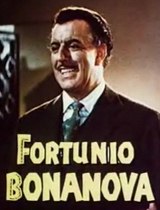Fortunio Bonanova
| Fortunio Bonanova | |
|---|---|

From the film Fiesta (1947)
|
|
| Born |
Josep Lluis Moll 13 January 1895 Palma de Mallorca, Mallorca, Balearic Islands, Spain |
| Died | 2 April 1969 (aged 74) Woodland Hills, Los Angeles, California, U.S. |
| Occupation | Actor/Opera singer |
| Years active | 1922–1964 |
Fortunio Bonanova is the pseudonym of Josep Lluís Moll (13 January 1895 in Palma de Mallorca – 2 April 1969 in Woodland Hills, California), who was a Spanish baritone singer and a film, theater, and television actor. He occasionally worked as a producer and director.
According to Lluis Fàbregas Cuixart, the pseudonym Fortunio Bonanova referred to his desire to seek fortune, and his love of the Bonanova neighborhood in his native Palma de Mallorca.
As a young man, living under his birthname, he was a professional telegraph operator. He studied music with the Italian Giovachini. In 1921, he debuted as a singer in Tannhäuser, at the Teatre Principal in Palma. That year, along with a group of Majorcan intellectuals and Jorge Luis Borges (who was briefly living in Majorca with his parents and sister), he signed the Ultraist Manifesto, using the name Fortunio Bonanova.
Also in 1921, he appeared in a silent film of Don Juan Tenorio by the brothers Baños, which was shown the following year in New York City and Hollywood. He later directed his own Don Juan in 1924.
In 1927, he acted in Love of Sonya, directed by Albert Parker and starring Gloria Swanson. In 1932 he had small parts in Hollywood productions featuring Joan Bennett and Mary Astor. In the same period, he appeared in New York in several operas as well as the zarzuelas La Canción del Olvido ("The song of forgetting"), La Duquesa del Tabarín ("The Duchess of Tabarín"), Los Gavilanes, and La Montería. In 1934, he returned to Spain, where he had a major role in the film El Desaparecido ("The disappeared one") written and directed by Antonio Graciani. In 1935 he acted and sang in the film Poderoso Caballero ("A Big Guy"), directed by Màximo Nossik.
...
Wikipedia
